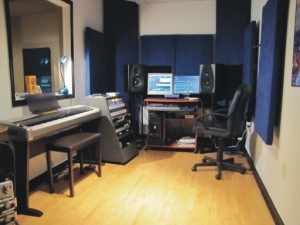Tips to Prepare for a Recording Session

Recording in the studio should always be a rewarding and enjoyable experience. So here’s a list of tips that will help you to make the most of your recording session.
Practice, Practice Practice
All band members should have all of their parts worked out in advance. If not, you’re going to waste valuable time (and money) in the studio making decisions that should have been made ahead of time. Singers should have all of their lyrics written and (preferably) memorized. Singers reading their lyrics from sheets of paper while recording their vocal tracks generally sound like, well…singers reading their lyrics from sheets of paper.
Another good idea is to record your own rehearsal/s, even if it’s a really rough recording on a cassette, camcorder, or even your phone. Then, sit down and listen carefully. Try to decide if all of the parts are working well together. If not, make adjustments to those parts ahead of time, rather than waiting until you’re in the studio. The best use of your time and money in a recording studio is recording, not rehearsing.
Playing with a Click Track
If you plan to play along with a click track (metronome) in the studio, it’s particularly important that you practice this in advance. Playing with a click allows for maximum flexibility during editing, allowing tracks or takes to be edited together smoothly. In order for these edits to work, you must play along with a click track, at a fixed, consistent tempo.
If you’ve never played along with a click track, you should start practicing now. It’s a learned skill, especially for drummers, and assuming you can just “pick it up” when you get into the studio is recipe for disaster. The first thing you realize when playing to a click is how badly your natural sense of time can drift, and therefore it’s critical to get used to “locking in” with the click, allowing it to guide your sense of time as you play.
So please, take my advice–if you want to record with a click track, practice with one well in advance. If you don’t have a metronome or other suitable source for a click track, you can also play along with CD’s using headphones. Nearly all commercial CD’s (with the exception of live albums) will have been recorded to a click, so playing along with those CD’s will help you develop the same skill required to play with a click.
Note that not all bands choose to record with a click. This does impose certain limitations when editing and mixing, but if you want your recording to have more of a “live” feel, then this may be the way to go. Read our article,
“To Click or Not to Click” for more details.
Prepare Your Equipment
Check your instruments to ensure that they’re in tip-top condition before the session. This includes tuning or replacing old drum heads, guitar and bass strings, tightening loose nuts and bolts, lubricating moving parts (such as kick drum pedals), etc. Some of those squeaky parts may not create problems when playing a live show, but they could ruin a great take in the studio.
Also, be sure that you bring all the equipment with you that you’ll need for the session. This includes instruments, amps, cables, extra strings, sticks, music stands, drum heads, etc. Don’t assume that the studio will have an extra piece of gear laying around for you to use on your song. As a rule, unless you’ve confirmed in advance with the studio that they can provide it, play it safe and bring it with you.
Bring printed copies of lyrics, arrangements, lead sheets, etc. for the musicians and singers to refer to when recording. Even if the singer has all of the lyrics memorized, bring printed copies in case they forget a line. Also, if the songwriter is not the singer, you may find out that what the singer sings is actually different from what the songwriter originally wrote.
It’s Not a Party
We know that recording in a studio is exciting, so it may be tempting to invite your your friends or family to come hang out with you while you’re working. But a recording session is not a party–it’s serious business. You’re paying good money to try and put down your best performance, and the more distractions you have in the studio, the harder it is to get that done.
If your friends or family want to check out the studio, by all means, take some pictures and post them on Facebook, or bring them to the studio some other time–but not on the day of your session. If you want professional results on your recording, you should conduct yourself like a professions, which means not having a bunch of friends hanging out with you while you’re working.
 August 12, 2009
|
Posted by Jon (admin)
August 12, 2009
|
Posted by Jon (admin)

 Categories:
Categories: 